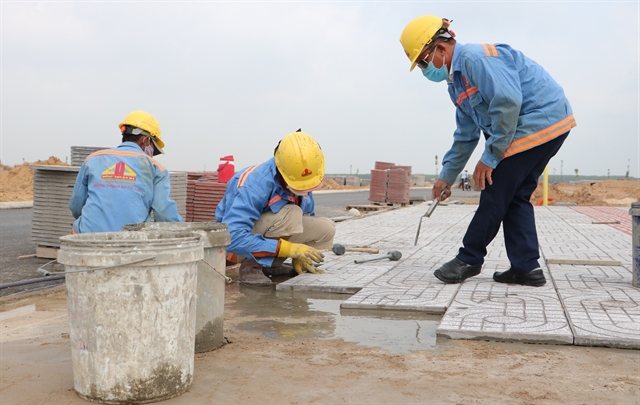
The State-run Airports Corporation of Viet Nam (ACV) said it is committed to start construction of Long Thành International Airport's passenger terminal early next year.
The State-run Airports Corporation of Viet Nam (ACV) said it is committed to start construction of Long Thành International Airport’s passenger terminal early next year.
 |
| Tiling of pavements in a residential neighbourhood meant for the households having to relocate to make room for the Long Thanh International Airport in the southern province of Dong Nai. — VNA/VNS Photo Cong Phong |
ACV, which is the investor of the expensive and ambitious transport hub project in the southern province of Dong Nai, told the transport ministry in a meeting held on Monday that the first component of the project – demining – is ongoing, while walls surrounding the land intended for the project (1,810ha of priority area) are being simultaneously carried out.
The whole thing is expected to be complete by September this year.
ACV asked Dong Nai Province’s authorities to continue supporting the contractors in ensuring security and protecting the boundary markers during the entire project.
Ground levelling, water drainage, and other essential works, will then follow so that the construction of the passenger terminal of the airport can begin in early 2022.
At the meeting, ACV also requested the authorities to soon finish land acquisition for land clearance at the two roads connecting to the airport, with an “appropriate compensation scheme” for the affected households.
Cao Tien Dung, Chairman of Dong Nai Province People’s Committee, said that a compensation scheme has already been approved by the Government and used in thousands of cases of affected households.
However, recently the State Audit Office of Viet Nam after review has recommended some changes to this approved scheme, but if the province is to follow through and cut down on the compensation level for the remaining households that have not moved yet would certainly lead to complaints and hinder land clearance progress.
Therefore, Dong Nai has asked the Government to maintain the compensation scheme originally approved, to create “uniformity” in the policy.
Dũng said the province is set to hand over the entire 5,000ha allocated for the project to the investor in June, and soon finish the temporary rehousing plans to move the affected households in the priority area of the project.
3,000ha of this total area involves the land of households and individuals.
By mid-April, the compensation scheme was approved for 4,000 households and individuals (out of the total 4,800), with 2,300 already receiving a total of VND5.4 trillion (US$234.8 million) for a total of 1,100ha.
Next week, Long Thanh District’s authorities would pay compensation worth VNĐ1.2 trillion for 811 households with 284ha.
Deputy transport minister Le Anh Tuan said Long Thanh is one of the breakthrough project of the national transport sector in the 2021-25 period, urging all parties to coordinate and facilitate the progress of all components of the project and disburse the allocated State capital.
ACV and Dong Nai should work together to see which compensation level is appropriate, Anh Tuan said.
The transport official also urged careful consideration and preparations to deal with problems arising from the airport’s surrounding walls, including potential waterlogging issues in the adjacent residential households.
Long Thanh International Airport will be built in three phases over three decades, and is expected to become the country’s largest airport.
In the first phase, one runway with a length of 4,000m, taxiways, an apron, and a passenger terminal with other auxiliary works sprawling 373,000 sq.m will be built to serve 25 million passengers and 1.2 million tonnes of cargo each year.
The airport is designed to have four runways, four passenger terminals, and other auxiliary facilities to ensure a capacity of 100 million passengers and 5 million tonnes of cargo a year by 2040.
It is expected to cost VND336.63 trillion ($14.5 billion), with the first phase needing over VND109 trillion.
(Source:VNS)



